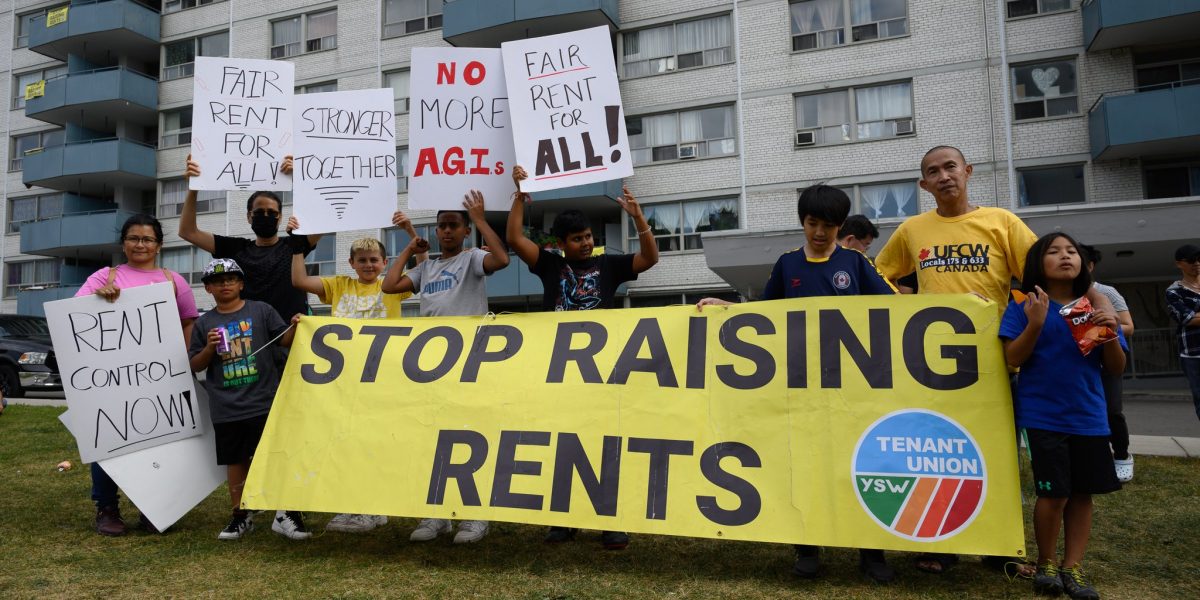On June 1, 2023, tenants at 33 King Street started a rent strike in response to above-guideline rent increases (AGIs) from their landlord, Dream Unlimited. The group is part of the York Southwest Tenants’ Union and has vowed to strike until reaching an agreement with the landlord.
Not long after, other Dream Unlimited tenants living at 22 John Street joined their neighbours on strike in response to skyrocketing rents in their building, which is not subject to rent control.
Momentum continues to grow as more than 100 tenants at 1440 and 1442 Lawrence Avenue West joined the strike on October 1, making this the largest rent strike in Toronto’s history. The landlord at 1440 and 1442 Lawrence Avenue West, Barney River Investments, has refused to provide basic maintenance in the building and has consistently increased rents above rent control guidelines.
Tenants in these buildings have organized to say enough is enough. They are fighting back against corporate landlords whose sole aim is to extract more and more profit from their tenants.
Tenants demand no more above guideline rent increases, building repairs
Tenants are demanding that landlords:
- Drop all previous AGI applications;
- Commit to applying for no more AGIs; and
- Immediately bring the buildings to a state of good repair, including but not limited to: eliminating the bed bug and cockroach infestations, maintaining the garbage chute, and addressing repairs inside units including mould, leaks, broken cupboards and floorboards, etc.
Progress has been difficult at times for the tenants. For example, at a meeting organized by Toronto’s Mayor in September, Dream Unlimited failed to attend, refusing to negotiate and opting instead to continue filing for evictions against tenants on strike.
The growth of the strike, however, shows that the landlords’ tactics are not working. Wider support for the strike has only increased over the last several months, with over 50 community organizations in the city formally announcing their support and many more coming out in person to advocate for the tenants on marches and demonstrations.
Rent strikes are also becoming more prevalent across Canada, with tenants taking action in Vancouver and Montreal. As the momentum picks up, it’s unclear how much longer these corporate landlords can maintain their untenable position.
High price of housing a systemic issue
Amid a general cost of living crisis, the cost of housing is severely impacting working people. The cost of renting, in particular, has seen astonishing growth over the last number of years. The cost of the average price of a rental unit in Toronto had increased by over 40 percent since 2021, reaching $2,822 per month.
Despite particularly steep rent increases in the past few years, the high cost of housing is by no means a new issue in Canada. In his new book, The Tenant Class, Ricardo Tranjan argues that the term ‘housing crisis’ is not an entirely accurate term to describe the state of play in Canada because the problem we are facing is not an unexpected failure of the system. The design of the housing system itself is the problem.
Presently, the Canadian housing market allows certain segments of society, namely property-owning landlords, to profiteer and accumulate wealth at the expense of tenants who live in rental housing. As a result, tenants then cannot find housing security due to the exorbitant rates they are charged.
Landlords’ ownership of housing capital allows them to exercise power over tenants and exploit them for profit. By focusing on the idea of a housing crisis, policy makers ignore the systemic nature of this unequal relationship, focusing on more technical solutions, such as increasing housing supply to meet perceived acute market demand and thus lower prices.
While it is important to have an adequate supply of housing to meet the needs of our growing population, the affordability of housing needs political, not technical, solutions. By focussing solely on the technical, government policy makes explicit concessions to the landlord class.
For example, the removal of rent control in Ontario by the Ford government in 2018 has left renters in many buildings subject to steep year over year rent increases across the province. What renters really need are ways to readdress the power imbalance between themselves and their landlords, ensuring they are provided with fair, safe, and stable housing.
Housing should be about ensuring people have homes, not ensuring landlords have profits.
Tenant organizing the way forward
Throughout Canada’s history, there has been a great history of tenant organizing. These struggles are what has traditionally made gains for renters. What tenants need, now more than ever, is a political response to build power they need to fight back against being exploited by corporate landlords..
The only way to ensure that tenants get a fair deal is through collective solidarity and organizing. This is exactly what we’re seeing now with the York South-Weston rent strike. It is absolutely imperative that we support the fightback of the York-South Weston Tenant Union and keep the momentum up for the tenants in those buildings by linking our struggles across the country and recognize the power of tenants to stand up to injustice.
Did you like this article? Help us produce more like it by donating $1, $2, or $5. Donate


